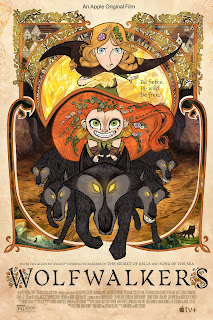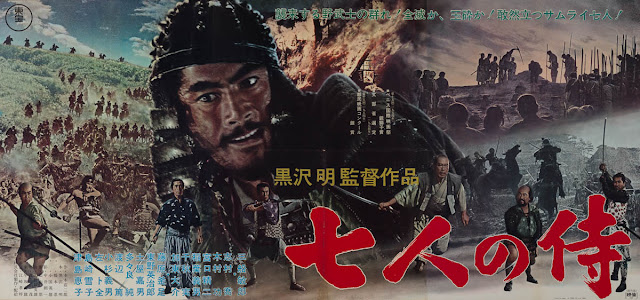Ani-May-tion: Wolfwalkers (Dir Tomm Moore and Ross Stewart, 1h48m, 2020)
Animation seems to be having somewhat of a raw deal at the moment, especially for the medium that basically carried cinema through the pandemic. Whether it be Oscar hosts punching down in the laziest way possible, labelling animation "just for kids" (in a year sporting several nominees that were absolutely not simply "just for kids"), or Netflix shredding any good-will for previously being the bastion of the medium by cancelling many of their upcoming series (including an adaption at last for the beloved Bone) in favour of...more Boss Baby. Nevertheless, there's hope on the horizon, as the cult comic Nimona is finally getting its time in the sun with a worthy cinematic adaption and Disney look set to return to 2D animation for the first time in over a decade.
What better time, thus, to turn to the animated world for that perennial part of the year I like to call Ani-May-tion. Whilst our journeys this month will take us from eccentric American families to Afgani refugees, and from Chinese myth to Japanese cyberspace, we start the month in Ireland, with Cartoon Saloon's Wolfwalkers. From the same studio (and indeed director) as the beautiful Book of Kells and The Song of the Sea, Wolfwalkers is a sumpteous fantasy epic in which the worlds of an English girl and her hunter father collide with that of a shapeshifter feral girl living in the forest with a pack of wolves. It is not just a beautiful movie-that goes without saying from the superb Cartoon Saloon, and the fact that the studio have never converted their four Academy Award nominations to a win suggests a snobbishness against 2D animation and the hegemony of Disney/Pixar, but perhaps the best film that the studio, and indeed director Tomm Moore have ever made.
We begin, with Mebh (Eva Whittaker), one of the titular wolfwalkers, whose pack comes across crofters who have come into the forest, and proceeds to rescue one of them, using her powers to heal them, before sending them back to the nearby town of Kilkenny, where we are quickly introduced, in a far more humdrum existence, Robyn (Honor Kneafsey), who, together with her father, Bill (Sean Bean), find themselves as part of the Lord Protector's occupying forces in Ireland. Robyn, having lost her mother, and with the encroaching wolves presenting a threat to children outside the town, is stuck within its walls, and yearns for the freedom she once had in England, this restriction not just seen in the way that she fusses back and forth in the house she and her father shares, in locked off shots, but in her make-belief hunting of the wolves. Not only this, but the local Irish children look down on her with distain and pick on her.
This entrapment inside the town doesn't last, though, as Robyn soon sneaks out after her father, who is laying traps for the wolves-this freedom is, however, shortlived, as, following an encounter with the wolves, her beloved falcon, Merlyn is shot, and seemingly dies, and her father is forced to rescue her, leading to the Lord Protector (Simon McBurney), consigning her to the scullery for her own safety. All of this, though, is upended by the reappearance of Mebh. With Robyn escaping from the Protector's men, and finding herself in a wolf's trap, so the mysterious figure of a red wolf appears, and rescues her, but not before leavng a bite mark on her arm. As they journey into the forest, so the wolf eventually reveals herself to be the nigh-feral girl, awaiting the return of her mother before they and their pack can move on, and that she has healed Merlyn, before mockingly chasing Robyn back to town, where her father dismisses the talk of the mythical wolfwalkers.
The mystery deepens when, as she becomes a scullery maid in the castle, Robyn stirs from the drudgery of her new existence to hear a voice coming from the Lord Protector's rooms, only to be ushered away from it. More is to come, as she wakes in the night to find herself transformed into a wolf, and her narrow escape from her father and the town in general gives way to some of the film's most beautiful sequences (not least because this sequence is accompanied by a song by Norwegian musician Aurora) as she reunites with Mebh, and both of them begin to bond as they explore the forest, the animation at its loosest, its most emotive, its most impressionistic. This happiness is not to last though, as Robyn's return to the town as a wolf causes chaos, with her attempted rescue of what turns out to be Mebh's mother. stuck in wolf form, leads to a near-riot, her father's demotion, and near-certain doom for the forest. Mebh and her pack's storming of Kilkenny and attempted rescue of her mother only further dooming the forest to a full-scale invasion and destruction by the forces of the Lord Protector.
It is here, thus, that the film tips into open war, the wolves against the forces that wish to destroy them; it is where the film's visuals are at their most striking, its narrative at its most unguarded on its subject matter, and where its emotional drive is at its most apparent. For, much as Wolfwalkers is a film about two girls becoming friends despite being separated by background and, of course, the magical ability to turn into a wolf, it is also, undeniably, a film about the subjugation of Ireland, albeit one where the Cromwellian figure of the Lord Protector eventually pays for his capture and imprisonment of Mebh's mother, and his iron-fisted fear and control over the Irish people. The film's action may end with an impressively taut stand-off in which every visual trick and animator's ability lends itself only to an ever-tauter action setpiece between a transformed Bill and the Lord Protector, but it is with the two families joining forces towards a new future that the film itself ends on.
At the heart of almost every single one of the studio's films,
undeniably, is Irish identity (the outlier being the superb and
emotionally driven The Breadwinner)-they are films shot-through
with Irish mythology, from selkies and Tuatha Dé Danann, or Celtic fae,
to werewolves and Irish Gods and Warriors, such as the Manannán mac Lir
and Macha. This is to say nothing of the embeddedness in Irish history,
with the illumination of the transendant Book of Kells the narrative
heart of Moore's first film, The Book of Kells, and the clear
impact that Irish artworks such as illuminated manuscripts meet and meld
with influences as far apart as Ghibli, the legendary animation master,
Richard Williams and painter Wassily Kandinsky in sublime, and
defiantly 2D-based animation. Wolfwalkers is no different, but
its focus on some of the darkest periods of Irish history-the film's
villain is a barely disgused Cromwell, whilst its central struggle comes
in the aftermath of the brutal occupation by the Lord Protector and his
forces-makes it an altogether different beast from the previous two
films in the Irish Folklore Trilogy
Moore and Cartoon Saloon's artstyle...breathes. It is at points
breathtaking to think that this is essentially fully hand-drawn-at
points, we see pencil lines, outlines appear and disappear around
character's heads, the work of animatiors not hidden, but on full
display, proudly shown, or ink flowing just outside of a character's
outfit. Against this almost beautfully honest piece of animation, where
that characteristic art-style has now been honed to utter perfection, comes one of the
most distinctive visual styles in cinema, that mix of watercolours and
textures and illuminated manuscript and top down perspectives and
changing aspect ratios and split screens, through which our characters
journey, the finest details and the colossal landscape treated with the
same care and attention. That this art style has only been further honed
over the eleven years between Kells and Wolfwalker only further emphasises how superbly this studio have grown as a creative force.
Wolfwalkers is, undeniably, the best film that Cartoon Saloon have made to date-it undeniably shares a great deal with its older siblings, The Book of Kells and Song of the Sea, in its perfectly wrought mix of beauitful animation, the rich vein of Irish mythology that still remains remarkably untapped by popular culture, and defiant pride in Irish history and artwork-but it feels like a nigh perfect honing of everything that these masters of 2D animation have created over the past decade.Wolfwalkers is so much more than merely the singular Cartoon Saloon topping off their Irish Mythology trilogy with a tale of two girls, and their worlds of 17th Century Ireland and folklore colliding.
Much like its heroines, it is utterly charming, in its combination of
Irish myth and technically breathtaking, and undeniably masterful
animation. It is the return, at full-throated-charge, at full animation, of the traditionally animated film in an effortless masterclass from these Irish masters of the medium.
Rating: Must See (Personal Recommendation)
Like articles like this? Want them up to a week early? Why not support me on my Patreon from just £1/$1.20 a month! https://www.patreon.com/AFootandAHalfPerSecond

.jpg)

Comments
Post a Comment